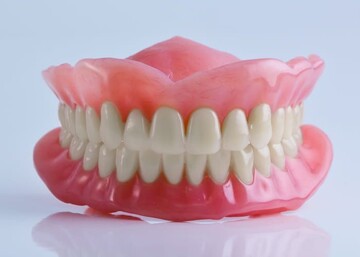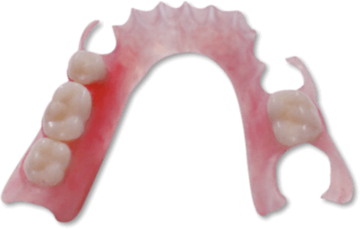dentures
It is sometimes difficult to get used to your newly placed dentures. They can feel bulky, loose and awkward. In order to make your adjustment period smoother, here are a few guidelines to follow:
- Wear your dentures all the time after you first receive them.
- Never use adhesives on your dentures unless instructed to by your doctor.
- When you go to sleep, remember to always remove your dentures.
- Always brush your dentures after removal and store them in a bowl of water. You can soak your dentures in a denture cleaner as well, but only after you have brushed them.
- If you experience any sore spots, looseness or discomfort please let your doctor know so they can help.
Never try to adjust your dentures on your own, each individual will have a different adjustment period and it will take time for you to become comfortable with your new teeth.
Approximately 40% of your jawbone structure will be gone after wearing your dentures for just six months. You will begin to notice that your dentures aren't fitting the way they used to after a few years of wearing them as well. This is because over the years, the structure of your jawbone becomes unable to support your denture. The same thing happens even if you are wearing a partial denture.
Once the structure of your jawbone is gone, your options for tooth replacement become very limited. Dental implants can stop bone loss and provide your mouth with natural looking teeth before the jawbone structure is completely lost.
A full arch denture is a removable tooth replacement option for those who need all their teeth replaced. They can be crafted to provide the characteristics (tooth shape and color) the patient desires. Advances have been made in the materials used for dentures and in the way they are designed. If you already have dentures (partial or full arch) you may be experiencing a loose fit or denture slipping. This can lead to gum sores, can affect your chewing and your speech and decrease your confidence when speaking and/or laughing with others. We can help restore your dentures to the correct fit.
This type of denture is made to be placed in the mouth immediately after you have all your natural teeth extracted. This allows you to leave the office without the embarrassment of having no teeth while the gums heal from the extraction. The denture is made to conform to your mouth at the moment impressions were taken. Your gums will change drastically over the next few months and it is possible that the dentures will rub against the gums causing some soreness until the denture is adjusted. Most patients will require a realignment of their denture within the first few months due to the gums shrinking from the extraction of teeth. Another benefit of immediate dentures is the fact that the dentures act as a bandage to the extraction sites which covers the tooth sockets and prevents them from becoming irritated. Just remember, never remove the denture yourself, even for a brief moment unless your dentist has instructed you to. The gums have a tendency to swell when uncovered at first and if you are without your dentures for a little while they may never go back in.
An over denture fits on-top of natural teeth or dental implants. Many patients suffer with ill fitting and loose dentures that move or even fall out when speaking or eating. One way of solving this problem is to construct a dental plate that goes over and attaches to something underneath it. Keeping a few natural teeth or placing dental implants in the bone under the denture also helps keep the jaw bone healthy. This avoids much of the natural jaw bone loss often seen after teeth are removed. Traditional over dentures go over natural teeth. A denture can be made that goes over and attaches to one or both cuspids. Implants supported over dentures fit on top of dental implants. A retainer bar or retention balls are placed on the implants and special attachments are inserted into the denture to grab onto these retention devices. A new method using mini implant dentures is becoming increasingly popular. Mini implants are very thin, long titanium implants that screw into the jaw bone. They can be placed and old dentures can often be retrofitted to the implant.
Partial Dentures are used to replace missing teeth. Partials have metal hooks that grab onto the neighboring teeth for support. Unfortunately, the hooks have a tendency to loosen up the teeth and partial dentures have the tendency to get loose and require multiple adjustments throughout the years. On the upper, there is a large piece of metal that goes across the roof of the mouth which can interfere with taste sensation and/or have food collected under it. Additionally, the partial plate can press into the gum tissue and cause sores. The partial dental plate must be taken in and out each day for cleaning. It is certainly not an ideal alternative.
Precision partial dentures are retained in the mouth by interlocking components. A specially shaped extension of the partial fits snugly into or onto a receiving area or projection of a natural tooth that has been crowned. This makes for anti-slip dentures that won't move or come out when you speak or chew.


